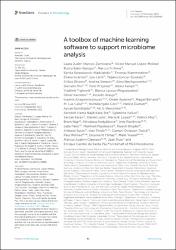A toolbox of machine learning software to support microbiome analysis

View/
Access
info:eu-repo/semantics/openAccessDate
2023Author
Marcos-Zambrano, Laura JudithLópez-Molina, Víctor Manuel
Bakir-Gungor, Burcu
Frohme, Marcus
Karaduzovic-Hadziabdic, Kanita
Klammsteiner, Thomas
Ibrahimi, Eliana
Lahti, Leo
Loncar-Turukalo, Tatjana
Dhamo, Xhilda
Simeon, Andrea
Nechyporenko, Alina
Pio, Gianvito
Przymus, Piotr
Sampri, Alexia
Trajkovik, Vladimir
Lacruz-Pleguezuelos, Blanca
Aasmets, Oliver
Araujo, Ricardo
Anagnostopoulos, Ioannis
Aydemir, Önder
Berland, Magali
Calle, M. Luz
Ceci, Michelangelo
Duman, Hatice
Gündoğdu, Aycan
Havulinna, Aki S.
Kaka Bra
Kardokh Hama Najib
Kalluci, Eglantina
Karav, Sercan
Lode, Daniel
Lopes, Marta B.
May, Patrick
Nap, Bram
Nedyalkova, Miroslava
Paciência, Inês
Pasic, Lejla
Pujolassos, Meritxell
Shigdel, Rajesh
Susín, Antonio
Thiele, Ines
Truică, Ciprian-Octavian
Wilmes, Paul
Yilmaz, Ercument
Yousef, Malik
Claesson, Marcus Joakim
Truu, Jaak
Carrillo de Santa Pau, Enrique
Metadata
Show full item recordAbstract
The human microbiome has become an area of intense research due to its
potential impact on human health. However, the analysis and interpretation
of this data have proven to be challenging due to its complexity and high
dimensionality. Machine learning (ML) algorithms can process vast amounts
of data to uncover informative patterns and relationships within the data, even
with limited prior knowledge. Therefore, there has been a rapid growth in the
development of software specifically designed for the analysis and interpretation
of microbiome data using ML techniques. These software incorporate a wide
range of ML algorithms for clustering, classification, regression, or feature
selection, to identify microbial patterns and relationships within the data and
generate predictive models. This rapid development with a constant need for
new developments and integration of new features require efforts into compile,
catalog and classify these tools to create infrastructures and services with easy,
transparent, and trustable standards. Here we review the state-of-the-art for ML
tools applied in human microbiome studies, performed as part of the COST Action
ML4Microbiome activities. This scoping review focuses on ML based software
and framework resources currently available for the analysis of microbiome data
in humans. The aim is to support microbiologists and biomedical scientists to
go deeper into specialized resources that integrate ML techniques and facilitate
future benchmarking to create standards for the analysis of microbiome data.
The software resources are organized based on the type of analysis they were
developed for and the ML techniques they implement. A description of each
software with examples of usage is provided including comments about pitfalls
and lacks in the usage of software based on ML methods in relation to microbiome
data that need to be considered by developers and users. This review represents
an extensive compilation to date, offering valuable insights and guidance for
researchers interested in leveraging ML approaches for microbiome analysis

















